|
|
|
Sort Order |
|
|
|
Items / Page
|
|
|
|
|
|
|
| Srl | Item |
| 1 |
ID:
158939


|
|
|
|
|
| Summary/Abstract |
This paper explores the effects of moral pluralism and moral conflict on political conduct and subjectivities. Challenging cultural relativist and monist positions, but going beyond a solely pragmatist reading of South Asian politics, it displays how actors navigate between conflicting roles, domains, commitments, and values. These contradictions, I argue, have a structuring effect on politics. This is not only because attempts to juggle different moral values guide political conduct, but also because moral evaluations of leaders are one constituting element of political legitimacy. I explore these effects through a case study from Darjeeling, India, where a movement for regional autonomy demanding ‘virtuous’ dedication from leaders and followers seems to pose a counterpoint to a perceivably ‘dirty’ party politics. The case shows that there is not one overarching value guiding political conduct, but that different priorities gain or lose importance over time. Far from being passive subjects forced to comply with immoral politicians, some decide to live up to their personally held principles.
|
|
|
|
|
|
|
|
|
|
|
|
|
|
|
|
| 2 |
ID:
158941
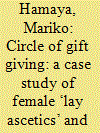

|
|
|
|
|
| Summary/Abstract |
This article investigates everyday practices of begging among female ‘lay ascetics’ in Haridwar, North India. The subject of female asceticism or renunciation in Hinduism has been far less examined than that of male renunciation. Recent feminist-conscious studies have pointed out that female ascetics are generally marginalized within, or completely excluded from, male-dominated ascetic communities, albeit some charismatic female gurus do manage to establish a measure of authority. But gender-based inequality is not the only form of inequality that matters here. This article explores the lives of female ‘lay ascetics’ who are regarded as neither authentic renouncers nor ordinary householders. While male ascetics are prioritized in receiving alms, most female ascetics must struggle to obtain alms through making use of their social networks. Female ascetics cooperate with each other in this for both their mutual advantage and for spiritual reasons. Yet serious competition over alms can and does arise, which can generate moral dilemmas and severe conflict. Through ethnographic descriptions of their gift exchanges, this article will clarify how female ascetics form social networks which are neither completely obligatory nor completely free.
|
|
|
|
|
|
|
|
|
|
|
|
|
|
|
|
| 3 |
ID:
158943
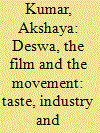

|
|
|
|
|
| Summary/Abstract |
In the last decade, the Bhojpuri film industry has made its presence felt across most of north India, but also in many large cities of peninsular India. However, this emergence has also brought to the fore various questions around taste, class, region and representation. Nitin Chandra’s ‘unreleased’ Bhojpuri film Deswa sought to alter the ‘vulgar’ orientation of this industry, but had to wait for nearly four years to finally release as a Hindi film. Arguing that the vibrant debate that took place on the fundamental distinctions of Deswa is animated by Chandra’s persistent desire to narrate Bihar’s lost glory and utmost disrepair, I assess in this paper the industrial constraints that shaped the journey of Deswa. Drawing contrasts and parallels with the Hindi film industry, and drawing upon Pierre Bourdieu’s theoretical modeling of the field of cultural production, I locate the Deswa debate as a key moment in the contestations over subject positions, industry infrastructure, and linguistic affinities.
|
|
|
|
|
|
|
|
|
|
|
|
|
|
|
|
| 4 |
ID:
158942
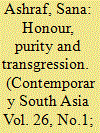

|
|
|
|
|
| Summary/Abstract |
Since the incorporation of anti-blasphemy laws protecting the religious sentiments of the Muslim majority in the Pakistan Penal Code in the 1980s, Pakistan has seen several cases of extra-judicial killings, mob violence and vigilante action against the accused. Based on my fieldwork in Punjab, Pakistan, this paper deals with the meanings associated with blasphemy, and violent action that follows the accusations. Focusing on everyday interactions at a local level, I argue that certain understandings of the notions of honour, shame, purity, and transgression provide meaning as to what constitutes blasphemy and what are desirable courses of action to be taken in response to perceived blasphemy. I further demonstrate how public religious discourse is utilized to mobilize people, by actively legitimizing violence in the name of love, and framing as the hero – a true Muslim – one who can kill for the sake of love and hence is capable of preventing shame by defending the Prophet’s honour.
|
|
|
|
|
|
|
|
|
|
|
|
|
|
|
|
| 5 |
ID:
158944
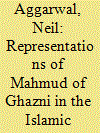

|
|
|
|
|
| Summary/Abstract |
The militant group known as the Islamic State has published periodicals in multiple languages since its declaration of a ‘caliphate’ in 2014. A series of articles in Arabic and English praises Mahmud of Ghazni (971–1030), raising questions into why a group based in the Middle East would take interest in a historical figure from South Asia. This research note situates themes from the Islamic State’s articles on Mahmud of Ghazni against the group’s other writings. Three main themes emerge: his attacks against Hindus were a jihad against non-Muslims; he pledged allegiance to the Abbasid Caliphate; and he annihilated Shia Muslims because of their ‘deviance’ from Sunni orthodoxy. Contrasting such themes against the historiographical record – including scholarship from South Asian Studies – highlights inconsistencies around which counter-messaging strategies could be constructed to advance the goals of counter-terrorism.
|
|
|
|
|
|
|
|
|
|
|
|
|
|
|
|
| 6 |
ID:
158940
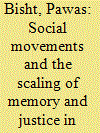

|
|
|
|
|
| Summary/Abstract |
This paper examines the politics of scale in the commemorative work undertaken by the International Campaign for Justice in Bhopal (ICJB), a coalition of social movement organisations (SMOs) seeking justice for the victims of the Bhopal Gas Disaster of 1984. The argument traces how the ICJB attempted to contest the localisation of the disaster by the Indian state and the transnational corporations involved. I outline how the disaster, which had been scaled down from an extraordinary global event to a private non-issue, was re-scaled successfully across multiple scales of meaning and regulation through ICJB’s mobilisation of the frame of ‘second/ongoing poisoning’. This contestation over the scaling of the disaster crucially involved multiple processes of memory-work. Drawing on archival research and ethnographic fieldwork, this paper reveals how the remembrance of the disaster functioned as a key site of the discursive and performative re-framings required to reinstate multi-scalar accountability for the disaster. Overall, the paper establishes the utility of the politics of scale approach in mapping the dynamics of the transnational mobilisations of memory by SMOs in pursuit of justice.
|
|
|
|
|
|
|
|
|
|
|
|
|
|
|
|
|
|
|
|
|